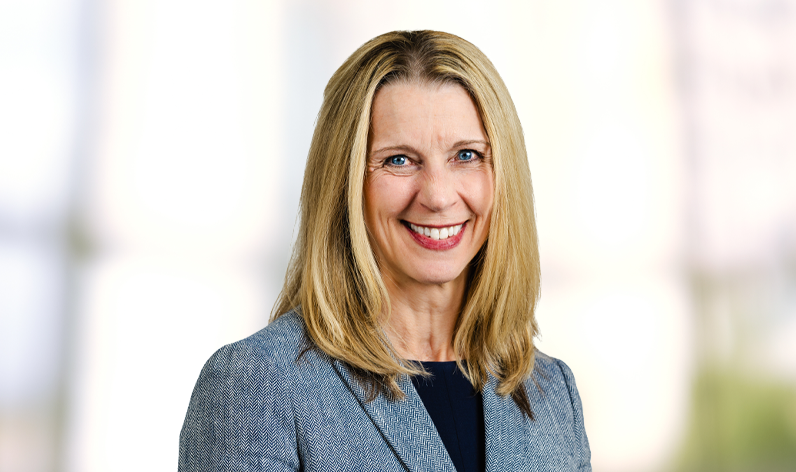A Q&A with the Reverend Lori Neff LaRue, Vice President, Education

In this Q&A, Lori reflects on the transformative impact of Lifelong Learning and how the Board of Pensions is uniquely suited to support Benefits Plan members in a changing world.
What do you think makes the Board’s approach to Lifelong Learning uniquely suited to support members in today’s complex and changing world?
The mission of the Education team is to offer plan members a comprehensive Lifelong Learning program that addresses matters of financial, spiritual, vocational, and physical and emotional well-being — and attends to the continuing formation of sound financial and life behaviors — understanding that the Board’s benefits are more effective in the context of such holistic formation.
We are mindful that, while some of the topics we talk about are more technical in nature, others are deeply personal, values-oriented, and perhaps rooted in our faith. Our programs are informed by A Theology of Benefits and designed to support the Board’s commitment to help plan members flourish and to enjoy life abundant.
Through its staff, consultants, and partners, the Board of Pensions has access to a wealth of subject matter experts and thought leaders on a multiplicity of topics. We are able to leverage that expertise to equip our members with the knowledge, tools, and resources to respond to the complexities of the changing Church and the evolving landscape in our communities.
How do you ensure that Lifelong Learning offerings are relevant and meaningful for members serving in different roles?
We recognize that our members are incredibly diverse and enter the learning space with very different needs and experiences. We serve a variety of people in congregations, affiliate organizations, and specialized ministries. Vocation, location, and demographics all impact how someone might experience specific conversations. As a result, both our content and our educators need to reflect the breadth of our membership and the uniqueness of their circumstances.
The Education team spends a lot of time listening. When we lead a program and engage with members, we’re curious about their experiences and realities. We pay attention to the stories they share and their pain points. We talk with colleagues, internally and across the denomination, to understand what they’re seeing and hearing, and to evaluate relevant data that informs our decisions. As educators, our team engages in our own lifelong learning — reading, attending webinars, exploring research and scholarship, and reflecting on our lived experiences.
All these factors help guide the development of our offerings and inform the kinds of conversations we want to be having with members.
Presbyterian CREDO is celebrating 20 years of supporting ministers. What do you think has contributed to its longevity and continued relevance for those in ministry?
CREDO means “to what do I give my heart.” At its core, the program is about connecting with and listening to the heartbeat of God — and syncing our heartbeats with God’s. Ultimately, finding the sacred rhythm that guides our lives. CREDO provides a holy respite and offers the space where participants can discern: Who am I and what do I value? Who has God created me to be and how am I living into my calling? Where am I out of alignment with God’s desire for me my core values? What changes are necessary for realignment to occur and what practices will sustain me? By engaging this deeply personal and sacred work, CREDO participants begin a journey toward transformation.
A critical piece of what has been most meaningful for our minister members — is that the program design provides a wonderful opportunity for participants to step away from the day-to-day demands of ministry, to exhale. They can set aside technology and the pressures of daily life and ministry to focus intentionally on themselves and their relationship with God. All the while, they are surrounded and supported by a community of colleagues and a gifted faculty team, incredible hospitality, and meaningful worship.
In any season of life and ministry, this work of heart, mind, body and spirit is relevant, important, and sacred work. Because of that, the CREDO program has been vital to the sustained ministry of countless ministers. Participants frequently write us letters telling us how timely, critical and transformative the program was at a point in their life and ministry when their wellspring had run dry. CREDO is about creating a living stream and a sustainable spirit — balancing creativity and consistency. For these and many other reasons, the program continues to hold relevance and importance for ministers and for the wider church.
Why is lifelong learning an important part of wholeness?
I continue to be inspired by the stories and journeys shared by our learners. We consistently receive feedback from any number of program participants that they were deeply affected by something they learned or reminded of the importance of community as they gathered with other attendees.
At this year’s Well-Being Retreat, I had the opportunity to spend time with plan members who expressed profound appreciation for the ways the Board of Pensions has companioned them on their journey. Through financial hardships, their participation in a CREDO conference, significant health struggles, retirement planning support, loss of loved ones — the Board, through its staff and programs, has been a valued source of support.
To be gifted with these sacred stories is a profound source of inspiration.
Knowing the Education programs we offer under the CREDO and Lifelong Learning umbrellas have provided momentary or longer-term transformation for our participants reinforces my belief that lifelong learning is integral to living a life of wholeness. Ongoing growth and formation as individuals and as members of learning communities is fundamental to flourishing.
